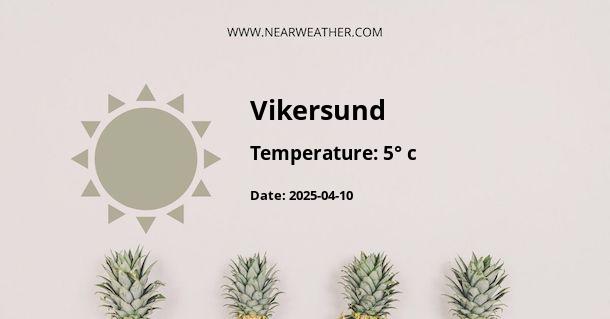Vikersund, Norway: Climate and Weather Year Round
Vikersund is a small town located in the eastern part of Norway, known for its stunning natural beauty and picturesque landscapes. The town experiences a temperate oceanic climate, influenced by the North Atlantic Drift, which brings relatively mild temperatures throughout the year. In this article, we will explore the climate and weather patterns in Vikersund, providing detailed information about temperature, precipitation, and other meteorological factors.
Temperature
Vikersund enjoys mild summers and cold winters, typical of its northern European location. The average temperature in the summer months, from June to August, ranges between 15°C (59°F) and 20°C (68°F). However, it is not uncommon for temperatures to reach as high as 25°C (77°F) during heatwaves. The winter season, from December to February, brings colder temperatures, with average highs ranging between -5°C (23°F) and 0°C (32°F). During the coldest nights, temperatures can drop as low as -10°C (14°F) or even lower.
It is worth mentioning that Vikersund experiences significant variations in temperature throughout the year, with spring and autumn acting as transitional seasons. The average temperature in spring (March to May) hovers around 5°C (41°F) to 10°C (50°F), while autumn (September to November) sees temperatures similar to those in spring. These transitional seasons can be characterized by rapidly changing weather conditions, with occasional swings between warm and cold spells.
Precipitation
Vikersund receives a moderate amount of precipitation throughout the year, with the highest levels occurring during the summer months. The wettest months are typically July and August, when rainfall averages around 100-120mm (3.9-4.7 inches) per month. The rest of the year experiences relatively lower levels of precipitation, with winter months being the driest. The annual average precipitation in Vikersund is approximately 850-900mm (33.5-35.4 inches).
While rainfall is the most common form of precipitation in Vikersund, the town also experiences snowfall during the winter season. Snow usually starts falling in late November or early December and lasts until March or April. The average snow depth in Vikersund during the winter months ranges from 30cm (11.8 inches) to 60cm (23.6 inches), providing a picturesque winter wonderland for residents and visitors alike.
Sunshine
Vikersund enjoys a fair amount of sunshine throughout the year, particularly during the summer months. In June and July, the town experiences up to 18 hours of daylight per day, providing ample opportunities for outdoor activities and exploration. However, during the winter season, the amount of daylight decreases significantly. In December, Vikersund sees only around 6 hours of daylight, making it the darkest time of the year.
It is important to note that Vikersund, like other northern regions, experiences the midnight sun phenomenon during the summer solstice. This means that around June 21st, the sun remains above the horizon for 24 hours, creating a unique and magical experience for those fortunate enough to witness it.
Wind
Vikersund is located in a relatively sheltered area, which means that the town experiences moderate wind speeds throughout the year. The prevailing wind direction is from the west, coming from the North Atlantic. However, wind speeds rarely exceed 10-15 kilometers per hour (6-9 miles per hour) on average. During stormy weather systems, wind speeds can increase temporarily, but they usually return to normal levels relatively quickly.
Climate Influences
Vikersund's climate is strongly influenced by the North Atlantic Drift, a warm ocean current that originates in the Gulf of Mexico. This current brings relatively mild temperatures to the region, preventing extreme cold spells in winter and providing moderate warmth in summer. The nearby mountains also play a role in shaping the climate of Vikersund, as they can create local microclimates and influence precipitation patterns.
Conclusion
Vikersund, Norway, offers a temperate oceanic climate with mild summers and cold winters. The town experiences moderate levels of rainfall throughout the year, with the wettest months being July and August. Snowfall occurs during the winter season, lasting from late November to March or April. Vikersund enjoys a fair amount of sunshine during the summer months, with up to 18 hours of daylight per day. The prevailing wind direction is from the west, with moderate wind speeds. The climate in Vikersund is influenced by the North Atlantic Drift and the nearby mountains, creating a unique and pleasant environment for residents and visitors.
A - Vikersund's Latitude is 59.965919 & Longitude is 9.995010.
A - Weather in Vikersund is -8° today.
A - Climate Conditions in Vikersund shows broken clouds today.
A - Humidity in Vikersund is 85% today.
A - Wind speed in Vikersund is 3.06 km/h, flowing at 350° wind direction. today.
